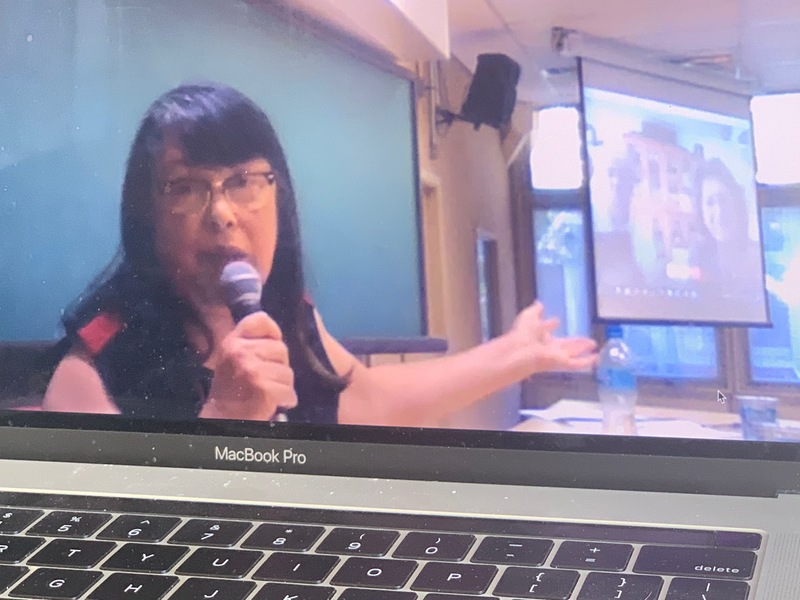New Learning’s Updates
Breaking Eggs to Make an Omelette: A Conference in Honor of Walkyria Monte Mór
Mary Kalantzis and Bill Cope speak online to a conference honoring their dear colleague, Walkyria Monte Mór at the University of São Paulo. Here is the statement by the Scientific Committee organizing the conference:
Long before literacy studies entered Brazil, Walkyria Monte Mór had already a dream - the dream of developing a national project (and who knows? an international project) as an exercise in in the development of a differentiated education for the formation of the citizen. Influenced by the DNA of the philosophy of education (Saviani, 2000), critical education (Freire, 2005), rupture (Ricoeur, 1978) of interpretative cycles, deconstruction (Derrida, 2013), among many other concepts, Monte Mór broke eggs to make omelet with her students and colleagues, without the certainty that is usually expected of projects of this nature, but with lucidity in her ponderings and an unconditional drive to make friends wherever she passes. This is the premise of those who "shoot at what they see and correct what they do not see," one of the presuppositions of her vision of the world, grounded her relationships, including those with her interlocutor of every moment, her husband, Sylvio Zilber, and also with Ruska, Tita, Tuco and Alfredo - to which we thank you deeply for giving up part of these moments for our formation - and the subjects she had been researching, namely: language education, new literacies (Lankshear and Knoebel, 2005), multiliteracies (Cope and Kalantzis, 2000), (1998), the "Theory and Practice of Critical Literacy" (Pardales, Damico, 2001, among others), technology and culture dialoguing with social demands for teaching, learning and training of language teachers.
Throughout her career, Monte Mór has reconciled two issues she considers crucial to understand historically the discrepancy between school and society and not hesitate to reinvent the inseparability of theory-practice. "If there is a dominant it is because the dominated” is one of the perceptions of what is understood as a crisis, which establishes an interface with the critic, recalling the lessons of Ricoeur (1978). Monte Mór understands that crisis is an opportunity from a critical literacy perspective. Cleverly she appropriated of Bourdieu's concept of habitus (1994) and created an analogy articulating a change in the interpretive habitus (Monte Mór, 2007), oriented by the openness to the thought (Morin, 2015). This she follows by problematizing the allotment of knowledge and (neo)liberal epistemologies centered on the supposedly vigorous balance between nature and culture; white and indigenous, etc. We dare say that she was a developer of a strategy that changed the focus of the of challenge as something heavy, to the lightness of possibilities. With her academic partner, Lynn Mario Menezes de Souza, she has chosen navigate these virgin waters, democratizing notions of literacy and knowledge with the participants in their National Project (NP).
In this project, Monte Mór has ingeniously transgressed customs, taking risks, approaching differences in the midst of similarities, elegantly promoting difficult (complex) spaces, sometimes dismantling rigid hierarchies, now living up to her humorous way of teasing, as "there is a Jesuit in every teacher." As someone who autocritically recognizes paradoxes, the ambiguity and the incompleteness of knowledge, exercising vibrant forms of intersubjectivity. When an impasse of any kind is generated? Easy! For her, it is a matter of strengthening strategic thinking and guiding the construction of meaning in what would be part of what she calls authoring and agency. Thus, authorship can emerge because there is democratically distributed space in the construction of meaning and in the shared agency that Monte Mór promotes.
As a result of collaborative work, the National Teacher Training Project in Theories of New Literacies the emphasis is on the constitution of critical agents and citizens. The transgressive and visionary spirit branched out into the National Project (PN) group leaving and opening traces that, today, are visible in Brazil and in international contexts as inputs for the development of the humanities in dialogue with other areas (such as technology of innovation), as well as to the social and economic relevance of the country. This commitment to education in order to understand crucial local-global issues also requires teacher education and research responsive to such issues, a practice that PN has been engendering transdisciplinarily with expressive success.
Among the many achievements, Monte Mór co-authored the Curriculum Guidelines for Secondary Education - Foreign Languages; author of the Didactic Guidebooks for EJA - Foreign Languages; co-coordinated the Brazil-Canada Knowledge Exchange project (BRCAKE) , and co-coordinates the Project on Knowledge Exchange and Research: Literacies and Languages in Teacher Education, signed in partnership with the University of Illinois (USA). The National Project (cycles I and II) has been considered one of the most important by the Department of Modern Letters, Faculty of Philosophy, Letters and Human Sciences (FFLCH) of the University of São Paulo (USP).
This former student of Freire empowers us to a kind of Think-and-Do approach to education and encourages us, caring to unlearn and relearn in media that are now increasingly mediated by technologies, but nevertheless quite as human. This event is in your honor!
[Text by Google translate, lightly edited]



A memorable event!
A well-deserved celebration of the outstanding contibutions of the work of Dr. Walkyria Monte Mór to education, language studies and critical literacies both in Brazil and in other countries around the globe. A truly inspiring and thought-provoking gathering of professionals passionate about teacher education and the role of language in society!
An unforgettable event!